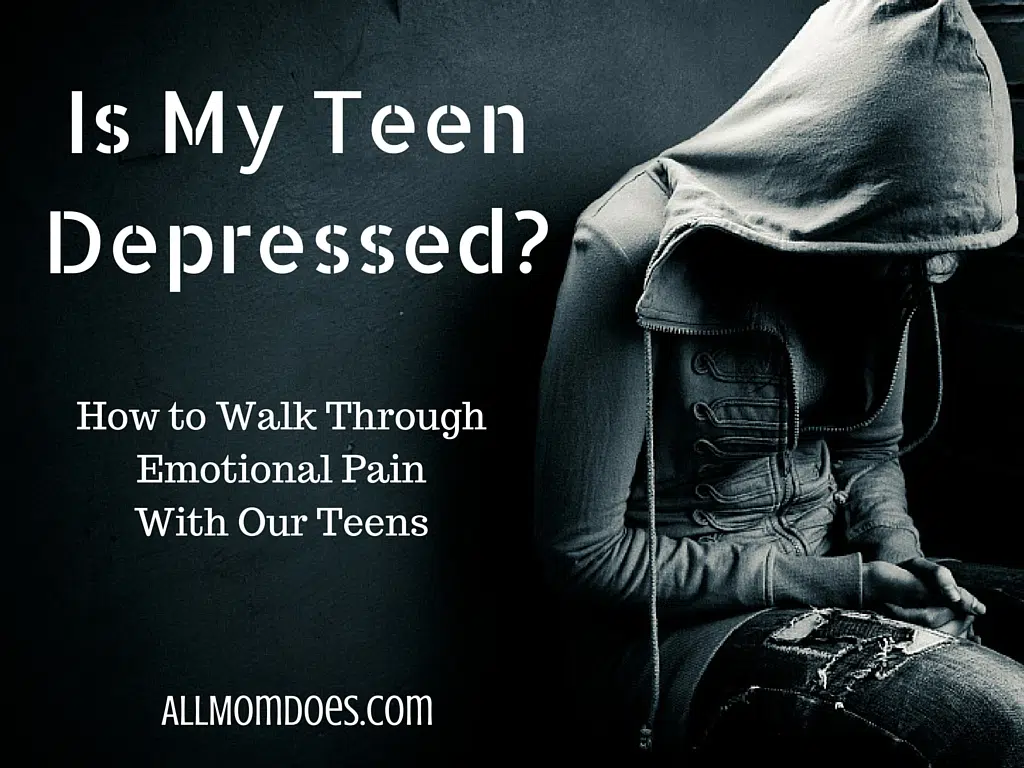Yikes! Youth Depression, what an awful thing to have to talk about. It is easier to sweep nasty words like “depression” under the rug and convince ourselves into thinking our teens are okay, but that doesn’t solve anything. The truth is many teens are experiencing extreme emotions and devastation, and they need you to be okay with hearing the things that aren’t fun to hear so they can navigate through their emotions. There are many forms and causes of depression, from clinical, chemical depression to brief situational bouts caused by a really bad week.
What do we need to know to help our kids through the hard times of life?
First, I want to say that it’s okay for your student to not be okay! The most important thing for your teen is to feel the freedom to talk to God and trusted adults about whatever is going on in their thoughts and emotions. The thing is, not talking about how someone is feeling or what they are thinking doesn’t mean that the thoughts and feelings aren’t there and real, so what is the point of keeping them in the dark where they can grow and could become harmful?
Mark 4:22 For everything that is hidden will eventually be brought into the open, and every secret will be brought to light. (NLT)
When our children feel able to come to us without the fear of criticism and judgment, we are able to model the ability for humans to go to God for help. We have the opportunity to teach our teens how to get help, release shame and walk through pain, which are lessons they will need for the rest of their lives. We have all been through times of deep pain, and knowing how we dealt with it can help our kids. Was there someone you could pray with? A Pastor, friend or maybe your parent? Let’s teach our children that it’s fine to not be okay, and what they do with the pain makes the difference.
When our teens give us attitude, our default reaction is “hormones” (and man aren’t their hormones going crazy!) but when their emotions or actions are raging, we need to watch carefully for lasting signs that our teen needs to talk.
Here are a few things to look for:
• Disinterest in activities they once loved.
• Difficulty doing regular tasks
• Grades dropping dramatically
• Sudden change in friend groups
• Change in sleep patterns
• Change in dress. (Your child going from caring about their appearance to no longer caring)
• Talk of death in a not permanent way
• Interest in morbid games, activities, movies
• Distancing themselves from relationships. (It doesn’t have to be all but could be some)
• Lashing out
• Self Harm
If you are seeing some of these symptoms in your teen, it is important to get to the root of why this is happening. You may need to go beyond the first few layers of the“normal” causes of sadness and look a deeper. Don’t stop digging until you get to the core of the issue. Be open to hearing things that are uncomfortable to hear. Responding instead of reacting to our kids is probably the hardest, yet most important discipline to learn in communicating with our teens. It could be something completely unrelated to their action or what they are saying. When you dig, dig with grace –use a fork instead of a shovel.
There are many obstacles that our teens face that may add to their depression.
Some are evident and have been around for years, but a lot are brand new to their generation. I do not list these things in the efforts for you to ban them or shelter your child in an extreme way, but in hopes to educate yourself and your teens to make healthy choices.
Possible contributors to depression:
• Social Media
Our children can click on a seemingly innocent hashtag (#) that takes them into a dark community with graphic photos promoting self-harm, porn, and even suicide. Experiment: go on Instagram and explore the #teen or #teenager WARNING: graphic material will be found.
• Bullying and Cyberbullying
Our teens feel shame and often do not want to tell us they are being verbally and even physically attacked at school or online. Your child could be commenting on a celebrity’s photo, and before they knew it 100s of complete strangers have attacked them with hateful comments just using their handle @……..
• Grief
A death is not the only source of grief. If a student is going through a transition or parents getting a divorce, this can also cause grief. Students are often labeled as “resilient” and because of that, they are expected to perform in school and in life like nothing has happened. Teens who are not able to process through grief may become depressed.
• Devices and gaming systems
Things can be said over text messaging and in gaming communities that you would never expect to be said in person.
So now that we’ve looked at what to look for in terms of what fuels the pain, how do we help our teens?
• Do not be afraid to seek professional help. Counseling is healthy and helpful to walk through challenges in life.
• If you believe your child could be clinically depressed, do not hesitate to get them the medical and professional help they need.
• Take them seriously. Your child needs to know that you are in their corner. We get to be their biggest supporters. It is better to say, “I hear you,” than “you’ll be fine.”
• Be an open door for them.
• Monitor their activity on and off their devices. Be open with them so they know you care enough to keep them safe. You can use this as a teaching tool to encourage character in every aspect of your teen’s life.
Monitoring tool: TeenSafe.com – use the promo code KaceeBree for 33% off first 3 months.
The most important thing to remember is where our hope lies, and that’s in Jesus.
Hebrews 6:19 This hope is a strong and trustworthy anchor for our souls. It leads us through the curtain into God’s inner sanctuary (NLT).
From one parent to another I know how overwhelming it is to be a parent of a teen. We want to lead them and love them. We want them to be healthy in all areas of their lives and when they are going through something it seems too heavy to handle but remember that our hope is in Jesus. He is our anchor when our circumstances are chaotic he has the ability to bring order.
We are in this together. Let me know how I can help you.
Kacee Bree Jensen
Suicide Prevention hotline 1-800-273-TALK (8255)

















